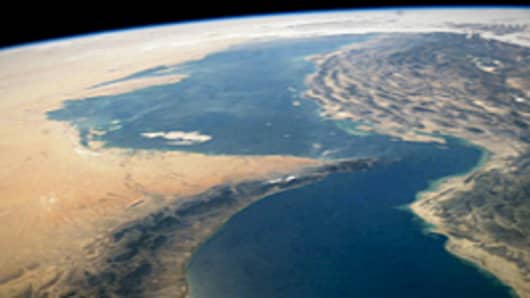Iran’s parliament is to debate a "double-urgency bill" which would halt all oil exports to the European Union in response to expanded sanctions by the bloc. The move threatens to rattle the envisioned five-month transitional period to allow members to find alternative sources of supply.
The European Union will ban oil imports from Iran starting July 1 in an attempt to force a change in stance on Iran’s nuclear policy.
Rostam Qasemi, Iran’s Oil Minister, was quoted by the official IRNA agency as saying “under the oil ministry’s plans, exports to some countries will soon be stopped”.
Various domestic sources pointed to a postponement of the deliberations and a possible parliament decision to later this week.
It remains to be seen how swiftly such a decision could be implemented on a practical level.
The International Monetary Fund warned in a note last week that a halt of Iranian oil without offset from other sources would result in an “initial” gain of 20 to 30 percent.
A closure of the Strait of Hormuz, the narrow waterway that sees through close to a fifth of global supply, would have a more substantial impact. For this year the IMF projects an average oil price of $99 per barrel.
But the EU has shock absorbers in place. In the event a sudden shortage materializes, the EU can use its emergency fuel stocks covering at last 90 days of average consumption.
Saudi Arabia, the world’s largest oil exporter, has repeatedly insisted it would fill any gap in global supply if needed. The country’s output is already at the highest levels in over three decades, with production running at 10.047 million barrels per day in November.
But the energy minister of OPEC member Algeria has already rejected any possible modification of its crude export regiment in the event of a shortfall of Iranian crude.
The head of the National Iranian Oil Company (NIOC), Ahmed Qalebani, said on Saturday that the recent EU decision would hit European refiners, and those with pending contracts with Iran. Italian oil and gas giant Eni says it is owed an estimated $1.4-1.5 billion for contracts from 2000-2001.
In comments run by the IRNA, Qalebani added that that the extent of any oil price spike would depend on the EU’s ability to find alternative sources of supply.
Although reluctant to narrow down oil price expectations, he believed that “in the future” it would reach “120 to 150 dollars a barrel”.
Meanwhile, Peter Voser, CEO of Shell, one of the largest clients of Iranian crude, told reporters on Friday that “from a pure commercial perspective, the losers are consumers because at the end of the day it gives us more volatility and upwards pressure on the oil price”.
The International Energy Agency report from January 19 already pointed to a decrease of 130,000 barrels per day in Iranian heavy crude bound for Europe in October compared to a month earlier.
In a sign that revived hopes for dialogue, experts from the IAEA, the United Nation’s nuclear watchdog, arrived in Iran to further investigate the scope of the country’s nuclear program and to “resolve all the outstanding issues with Iran”.
Ali Akbar Salehi, Iran’s Foreign Minister, told the Mehr news agency that they were “very optimistic about the mission and the outcome”.


